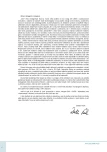TWO-STAGE MULTIDETECTOR CT-ANGIOGRAPHY OF RENAL TUMORS
Authors:
doc. MUDr. Jiří Ferda, Ph.D. 1; doc. MUDr. Milan Hora, Ph.D. 2; doc. MUDr. Ondřej Hes, Ph.D. 3; MUDr. Hynek Mírka 1; MUDr. Eva Ferdová 1; MUDr. Kristýna Ohlídalová 1
Authors‘ workplace:
Radiodiagnostická klinikaLF UK a FN Plzeň
1; Urologická klinika LF UK a FN Plzeň
2; Šiklův ústav patologické anatomie, LF UK a FN Plzeň
3
Published in:
Urol List 2006; 4(2): 32-35
Overview
Multidetector computer tomography (MDCT), which has been used since the end of 1990s, is based on the principle of dividing the detector band into several parallel series that give rise to several data traces at the same time. The width of individual parallel series ranges from 0.6 mm to 2.5 mm and the number of active series is 4 to 64. The resulting data set considerably improves resolution in the Z axis, which is equivalent to the width of the detector array used. On using a sub-millimeter detector system an up to 0.4 mm resolution can be achieved. Another advantage is a marked shortening of the time of examination (data acquisition takes 5 to 20 s) while the given resolution level is maintained. This examination mode is suitable for tumor staging, imaging of the renal inlet vessels, and its results can be used for planning the surgical intervention, especially a laparoscopic one. The authors describe the methodology of data acquisition, their reconstruction and evaluation, and the results obtained in the course of a 4-year use of MDCT at their clinic. They enumerate the advantages of MDCT as compared with other examination techniques and state that two-phase MDCT renal angiography represents currently an optimum method for renal tumor staging and can fully replace digital subtraction angiography.
KEY WORDS:
renal tumors multidetector computer tomography, CT-angiography
Sources
1. Hallscheidt P, Schoenberg S, Schenk JP et al. Multislice CT in the planning of nephron sparing interventions for renal cell carcinoma: prospective study correlated with histopathology. RöFö Fortschr Röntgenstr 2002; 174 : 898-903.
2. Israel G, Bosniak MA. Renal imaging for diagnosis and staging of renal cell carcinoma. Urol Clin N Am 2003; 30 : 499-514.
3. Rydberg J, Kopecky KK, Tann M et al. Evaluation of prospective living renal donors for laparoscopic nephrectomy with multisection CT: the marriage of minimally invasive imaging with minimally invasive surgery. Radiographics 2001; 21: S223-236.
4. Urban BA, Ratner LE, Fishman EK. Three-dimensional volume-rendered CT angiography of the renal arteries and veins: normal anatomy, variants, and clinical applications. Radiographics 2001; 21 : 373-386.
5. Wittenberg G, Kenn W, Tschammler A, Sandstede JJW, Hahn D. Spiral angiography of the renal arteries: comparison with angiography. Eur Radiol 1999; 9 : 546-551.
6. Sandstede JJW, Kaupert C, Roth A, Jenett M, Harz C, Hahn D. Comparison of different iodine concentrations for multidetector row computed tomography angiography of segmental renal arteries. Eur Radiol 2005; 15 : 1211-1214.
7. Jinzaki M, Tanimoto A, Mukai M et al. Double-phase CT of the small renal parenchymal neoplasms: correlation with pathological findings and tumor angiogenesis. J Comput Assist Tomogr 2000; 24 : 835-842.
8. Kopka L, Fischer U, Zoller G et al. Dual-phase helical CT of the kidney: value of corticomedullary and nephrographic phase for evaluation of renal lesions and preoperative staging of renal cell carcinoma. AJR 1997; 169 : 1573-1578.
9. Szolar DH, Kammerhuber F, Altziebler S et al. Multiphasic helical CT of the kidney: increased conspicuity for detection and characterization of small (< 3 cm) renal masses. Radiology 1997; 202 : 211-217.
10. Sheth S, Scatarige JC, Horton KM et al. Current concepts in diagnosis and management of renal cell carcinoma: role of multidetector CT and three dimensional CT. Radiographics 2001; 21: S237-S254.
Labels
Paediatric urologist UrologyArticle was published in
Urological Journal

2006 Issue 2
-
All articles in this issue
- CONVENTIONAL X-RAY EXAMINATIONS OF URINARY TRACT
- THE CURRENT POSITION OF RENAL ANGIOGRAPHY INCLUDING INTERVENTIONS
- THE POTENTIAL OF ULTRASONIC METHODS IN UROLOGICAL DIAGNOSTICS
- ULTRASONOGRAPHY OF PROSTATE, SEMINAL VESSICLES AND URINARY BLADDER
- MALE GENITALS AND IMAGING
- NATIVE CT EXAMINATION IN UROLITHIASIS
- DIFFERENTIAL DIAGNOSTICS OF RENAL CYSTIC LESIONS
- TWO-STAGE MULTIDETECTOR CT-ANGIOGRAPHY OF RENAL TUMORS
- Possibilities of imaging of urogenital tract tumors by 18FDG-PET/CT
- MRI EXAMINATION OF THE UROGENITAL SYSTEM - NEW METHODS AND THEIR USE
- MAGNETIC RESONANCE IMAGING IN UROLOGICAL INDICATIONS
- Urological Journal
- Journal archive
- Current issue
- About the journal
Most read in this issue
- DIFFERENTIAL DIAGNOSTICS OF RENAL CYSTIC LESIONS
- NATIVE CT EXAMINATION IN UROLITHIASIS
- THE POTENTIAL OF ULTRASONIC METHODS IN UROLOGICAL DIAGNOSTICS
- MAGNETIC RESONANCE IMAGING IN UROLOGICAL INDICATIONS
